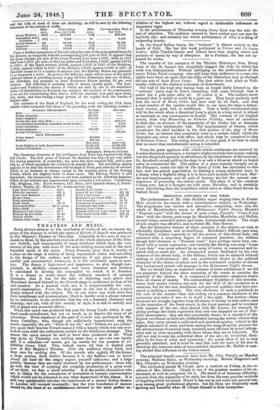The transfer of the company of the Theatre Historique from
Drury Lane to the St. James's has completely stopped the riots by which last week was distinguished. Without infringing on the performances of the merry Palais Royal company, who still keep their audiences in a roar, two nights have been set apart that the folks of the Historique may go through the ten acts of their Monte Cristo. The first soirée took place on Wed- nesday, without the slightest indication of disturbance.
One half of the huge play having been at length fairly listened to, the "national" party may be heard remarking, with some triumph, that it seems but a poor piece after all. Of course it is. The authors never dreamed that it would or could be a good one. They knew perfectly well that the novel of Monte Cristo had been read by all Paris, and that a vast number of the readers would like to see upon the stage a drama- tized version, good, bad, or indifferent. That a badly-constructed play will be the result when a theatrical form is given to a long novel, is almost as necessary as any consequence in Euclid. The versions of our English novels, from Guy Mannering to Nicholas Nickleby, were all attractive in their day, on account of the popularity of the books; but as dramatic pieces all were intrinsically bad. The imprisonment of Dantes, which constitutes the chief incident in the first portion of the play of Monte Cristo, has an interest that completely rests on a certain detail, which the dramatist can never use with effect, and which may be compared to that of Robinson Crusoe. The acting, however, is very good, if we bear in mind that no more than melodramatic acting is intended.


























 Previous page
Previous page